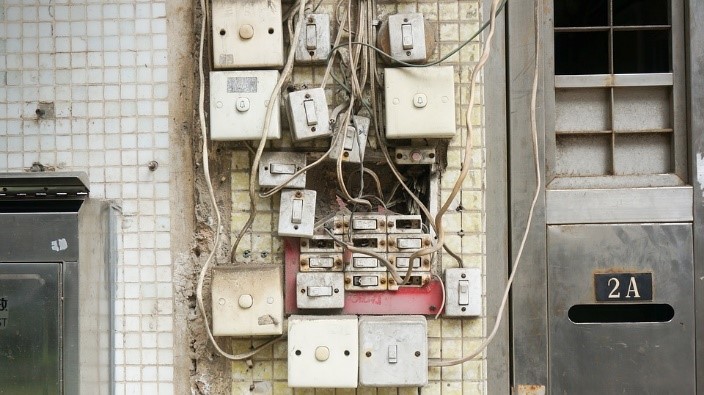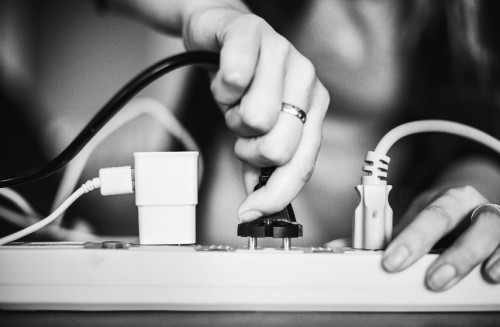The Top 6 Causes of Electrical Fires and how to prevent them

Home electrical fires account for an estimated 51,000 fires each year, nearly 500 deaths, more than 1,400 injuries, and $1.3 billion in property damage.
It is important to be aware of the dangers and potential causes of electrical fires in order to learn how to avoid them. In this blog, we will look at some of the most common causes of electrical fires and how to prevent them.
1. Common Electrical Outlets
Most electrical fires are caused by faulty electrical outlets (Receptacles) or worn out sockets that are not properly grounded. As outlets and switches get older, the wiring behind them wears as well, and wires are strung about that loosen overtime and could potentially break and cause a fire.
Worn out appliances are the culprit in many electrical fires because they draw a lot of power, and units with frayed and damaged cords pose an extra risk of igniting a blaze.
2. Outdated or Worn-out Electrical Wiring
Outdated electrical wiring often causes electrical fires. If a home is over 20 years old, it may not have the wiring capacity to handle the increased amounts of electrical appliances in today's average home, such as computers, wide-screen televisions, video players, microwaves, and air conditioners.
The outdated home wiring cannot handle the increased power load. Older wiring tends to heat up quickly and catches fire.

Sometimes it's hard to tell if you have old and unsafe wiring because electrical work is mostly hidden behind the walls of your home. Remember, however, that wiring problems are a major fire threat. Pay attention to these signs of hidden electrical issues:
- Frequently overloaded circuit breaker
- Flickering lights or intermittent power outages
- Appliances or electrical devices that feel excessively hot
- Shocks or sparks from appliances or outlets
- Unexplained burning smells
Hello there! On a related topic, we previously wrote a blog about Top 5 Advantages of Parallel Operation of Generators or Alternators. If this peaks your interest, check it out and let us know what you think
If you see any frayed electrical cords, they need to be replaced immediately by an electrician. These exposed cords that run along your floor or in your walls can be incredibly dangerous if they spit out a spark.
3. Cords and Electrical Circuit Overloads
Unrestricted use of extension cords is a major fire hazard. When the TV, home theatre, computer, and other appliances are all plugged into a single extension cord, it creates excessive power load on a single socket which may not be designed to handle that load.
This means the circuit is overloaded, and your home is at serious risk of an electric fire.

That is why it is important to make a conscious effort to never overload your outlets. If you don't have enough outlets to accommodate your needs, keep your home and your family safe, by calling a trusted electrician to install additional outlets.
Kinked or smashed cords produce more heat, eventually melting the insulation from the inside out.
4. Old Appliances:
Old appliances that have frayed cords or loose or faulty wiring can catch fire. Moreover, due to the high flammability of old insulation used in these appliances, a simple electrical repair to address these issues may not be enough. It's best to purchase updated appliances to ensure your safety.
Having older appliances risks the possibility that they may not be up to standard when it comes to wattage usage, material quality, and safety regulations. Stoves, toasters, fridges, all the things you can find in your kitchen are at risk for potentially starting electrical fires. Another issue with appliances and their correlation with fire, happens when multiple appliances are plugged into extension cords or power strips that do not have the capacity to withstand the large amount of energy that appliances need.
Call an electrician to install appliance-grade outlets that are designed for the kind of appliance and home that you have. Electricians can also install ground fault circuit interrupters that act as surge protectors to keep your house safe.
5. Light Fixtures:
Light fixtures, lamps and light bulbs are another common reason for electrical fires. Installing a bulb with a wattage that is too high for the lamps and light fixtures, is a leading cause of electrical fires. Always check the maximum recommended bulb wattage on any lighting fixture or lamp and never go over the recommended amount.
Another cause of fire is placing materials like cloth or paper over a lampshade. The material heats up and ignites, causing a fire. Faulty lamps and light fixtures also frequently result in fires.

Light bulbs aren't one-size-fits-all, so be sure to follow wattage guidelines for all light fixtures around your home. A 100-watt light bulb in a light fixture that calls for a 60-watt bulb can cause the whole thing to catch on fire. That's why it's important to never go above the maximum wattage listed on your lighting fixtures.
6. Portable Heaters:
Be conscious of where you place your space heaters in the wintertime, and never leave it on for an extended period of time, especially when you are sleeping or have left the house. Placing your portable heater next to curtains, rugs, beds, couches, and the like is one of the most common causes of fires.
If you do use space heaters, use the radiator-type that diffuses heat over the entire surface of the appliance. These are less likely to ignite flammable items, but should still be kept away from them.
Tips for Fire Safety:
- Repair or replace loose outlets as soon as you notice them. You may be able to tighten the wire nuts to improve the connection, or you may need to replace the outlet.
- Call a qualified electrician who follows the National Electrical Code to look over your home and replace old wiring.
- Get an expert to conduct a thorough electrical safety audit of your wiring, external power panels, and electrical wall outlets.
- Contact your security system company to install good-quality smoke detector alarms and fire extinguishers to bolster your chances of surviving any electrical fire, saving lives, and minimizing damage.
- Choose heavy-duty extension cords for every application. Lay the cord out of the way where no one will step on it. Don't run cords under floor rugs, which could generate excessive heat. Never permanently rely on extension cords. If you don't have enough outlets, have an electrician install more of them.
- Pay attention to your appliances. Check cords for excessive heat or exposed wires. If a device makes strange noises or operates improperly, don't wait until the cord catches on fire – repair or replace it immediately!
- Buy appliances that use quality materials, and follow approved safety standards.
- Ensure that all light bulbs and lighting devices are plugged into electrical sockets that match the prescribed wattage. Be careful not to overload light fixtures, and replace ones that seem to get excessively hot when lit.
- Avoid using extension cords for lighting purposes. Replace cords that are frayed or damaged.
- If your lights flicker or won't stay lit and you've ruled out light switch problems, replace these fixtures as soon as possible.
- Never decorate a lamp with paper or cloth that could ignite, and keep fixtures away from textiles, like bedding or curtains.
- Ensure that inflammable materials are positioned well away from portable space heaters. Better still, use radiation heaters that do not catch fire on direct contact.
- To reduce the risk of starting a fire when using a portable heater, only use an up-to-date model that includes all modern safety features. Make sure you have the appropriate-sized unit for the room you wish to heat. Position the heater away from areas of foot traffic, as well as furniture, curtains, bedding, and anything flammable.
- As with other appliances, plug it directly into a wall outlet. Use a heater only as directed and don't leave a unit running when you aren't present.

Stay Sharp & Join our Mailing List!
Subscribe to Allumiax Blog for updates on power system studies, tips, guides and insights on electrical engineering from industry leaders.






